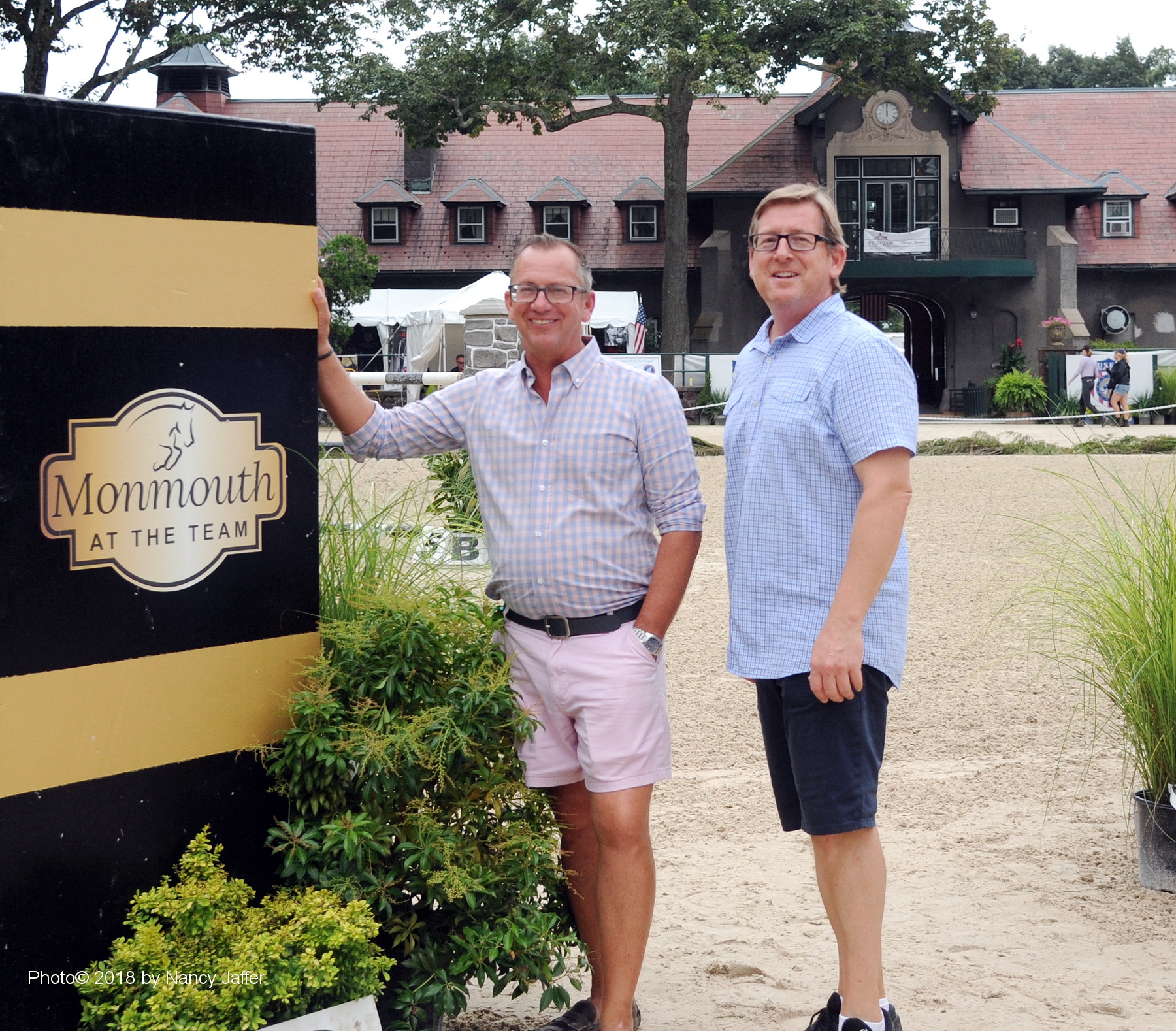What’s in the future for Monmouth at the Team?
The former Monmouth County Horse Show made an impressive statement as a boutique fixture in Somerset County, with the lure of lavish hospitality and a welcoming style. Most important in terms of attracting exhibitors and spectators was its new location at the U.S. Equestrian Team Foundation headquarters in Gladstone.
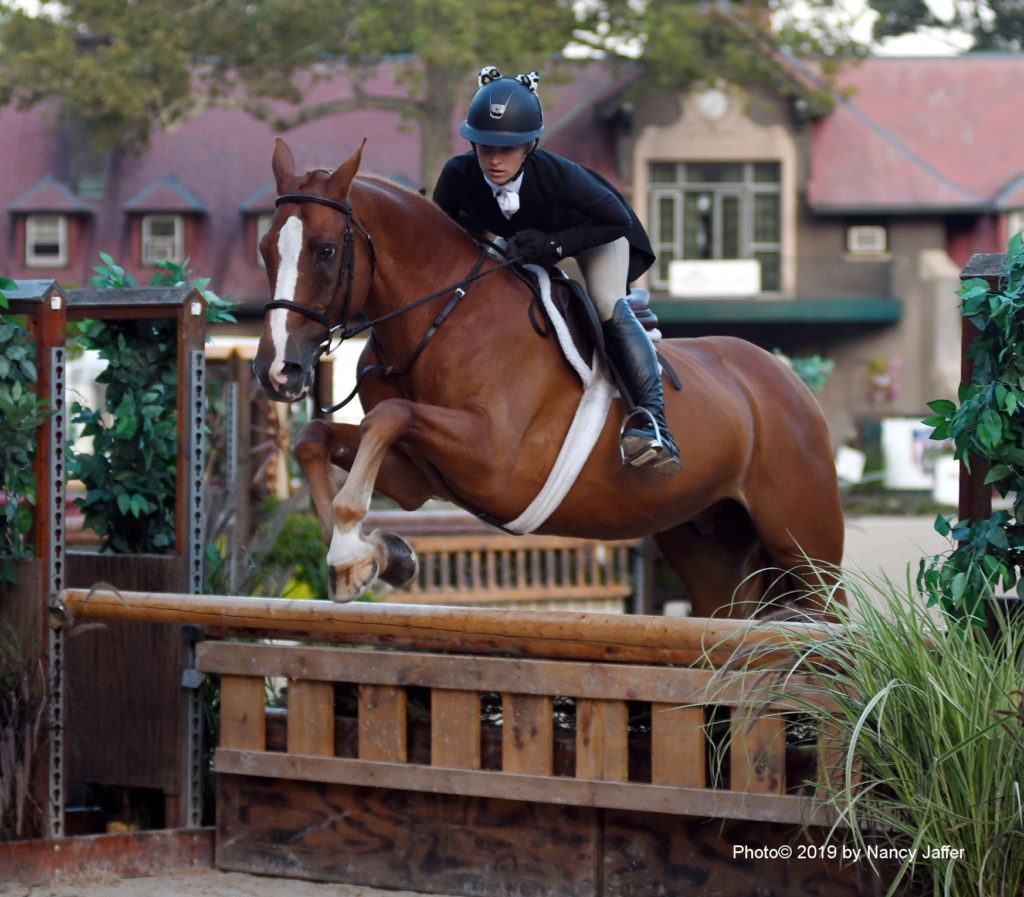
The U.S. Equestrian Team Foundation stables offered a dramatic backdrop for competition during Monmouth at the Team. (Photo © 2019 by Nancy Jaffer)
Exhibitors drawn to the iconic site could say they had ridden in the same ring where the likes of Bill Steinkraus and other show jumping legends trained, against a backdrop of the famous stables that are recognized around the horse world.
In 2016, its debut at the Team, the competition was named the New Jersey Horse Shows Association’s Show of the Year. But five years after Tucker Ericson and his cousin, Michael Dowling, moved New Jersey’s oldest show north from its namesake county, Covid struck. Like many shows, Monmouth at the Team was cancelled in 2020.
It was all set to return in 2021, but quarantine protocols for the Olympic dressage, para dressage and eventing teams meant they had to be isolated at the foundation before taking off for the Games. In the end, problems with flights meant they would quarantine in Germany, but that decision came far too late to accommodate Monmouth. It moved a half-hour’s drive away to Centenary University in yet another county, Morris.
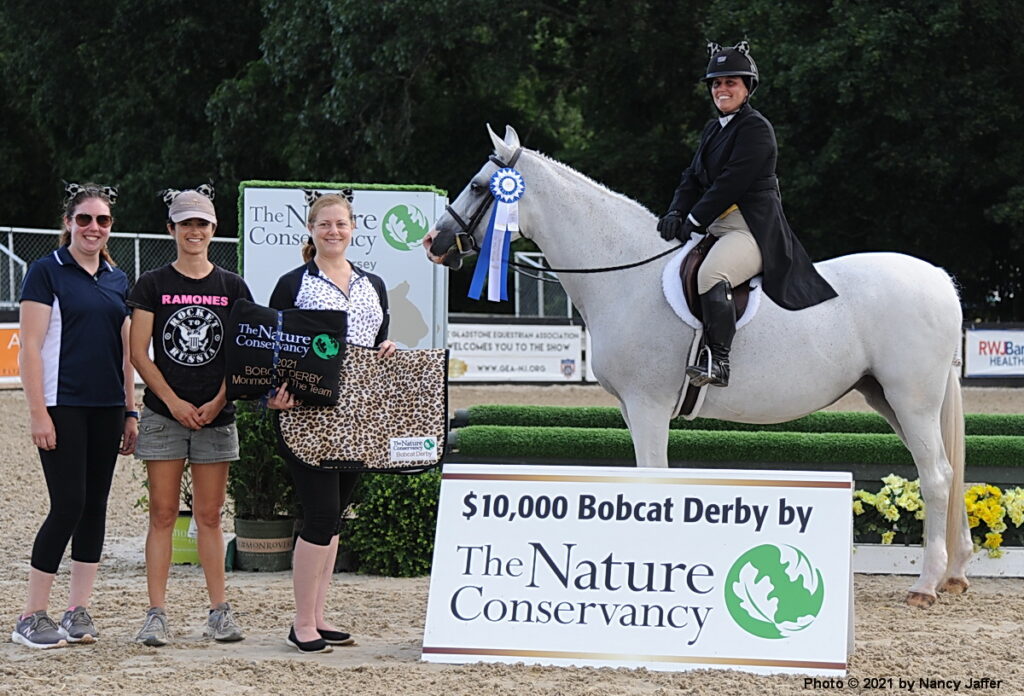
The Bobcat Derb–complete with bobcat ears on every helmet–translated to a new location at Centenary in 2021. (Photo © 2021 by Nancy Jaffer)
Now Tucker doesn’t think the show can return to the USET Foundation.
“Most likely, it will stay at Centenary,” he said, noting that university is considering taking on the show.
Tucker has a new job involving building insurance programs for a vehicle fleet management company and is working at it 10 to 12 hours a day while living in Philadelphia. That means he is unable to devote himself to the show the way he did in the past.
“I can’t do all the work,” he said, adding that his cousin also is busy with two jobs, teaching at Centenary and working as a trainer.
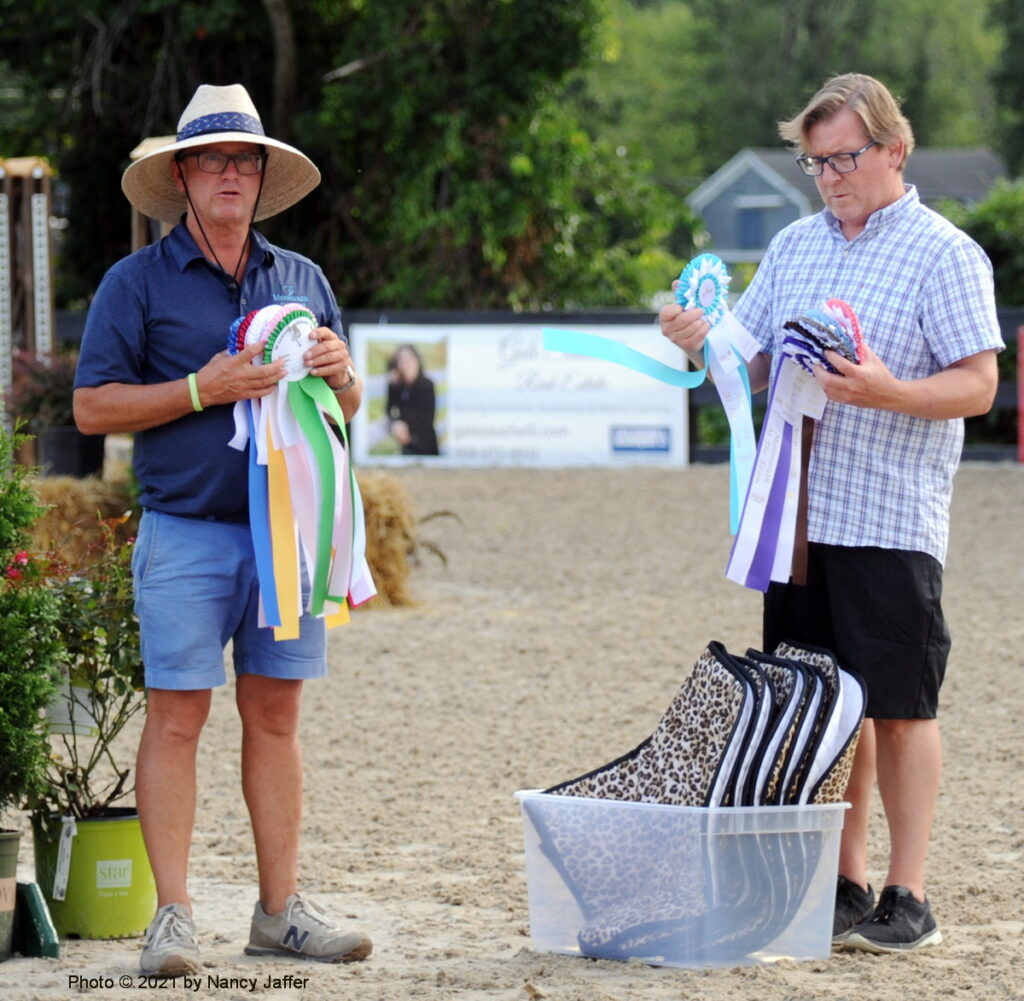
Cousins Michael Dowling and Tucker Ericson kept busy doing every job that had to be done at the show, whether it was at the Team or at Centenary, as it was this year. (Photo © 2021 by Nancy Jaffer)
Tucker hopes to stay involved with the show to some extent, but noted he and Michael need “to partner with someone who has a facility.”
If the foundation were willing to run the show, he would offer it the dates, but that isn’t happening because employees need to focus on the organization’s mission. The foundation is the philanthropic partner of the U.S. Equestrian Federation, helping to fund U.S. teams, programs and the development pathway, through charitable gifts and donations
Tucker has three concerns as he looks at what will happen with the show.
First, he needs to partner with an organization that is going to handle a lot of the groundwork, “which means doing emails and phone calls every week of the year.”
Second, he wants to keep it “separate and unique,” so it therefore shouldn’t be part of the three circuits that dominate the show scene in New Jersey.
The third thing that is most important to him in connection with the show is the Nature Conservancy’s Bobcat Derby, a very popular hunter derby with proceeds going to benefit the purchase of land that will help preserve and expand the bobcat habitat in the state.
“The Nature Conservancy kind of fits our values,” he explained.
The disadvantage of the foundation site is that while it has a great outdoor ring, it’s the only ring, which makes a show there very costly.
“You can’t make money on a one-ring show,” said Tucker, then quickly added, “It’s not even about making money; it’s the struggle to break even.”
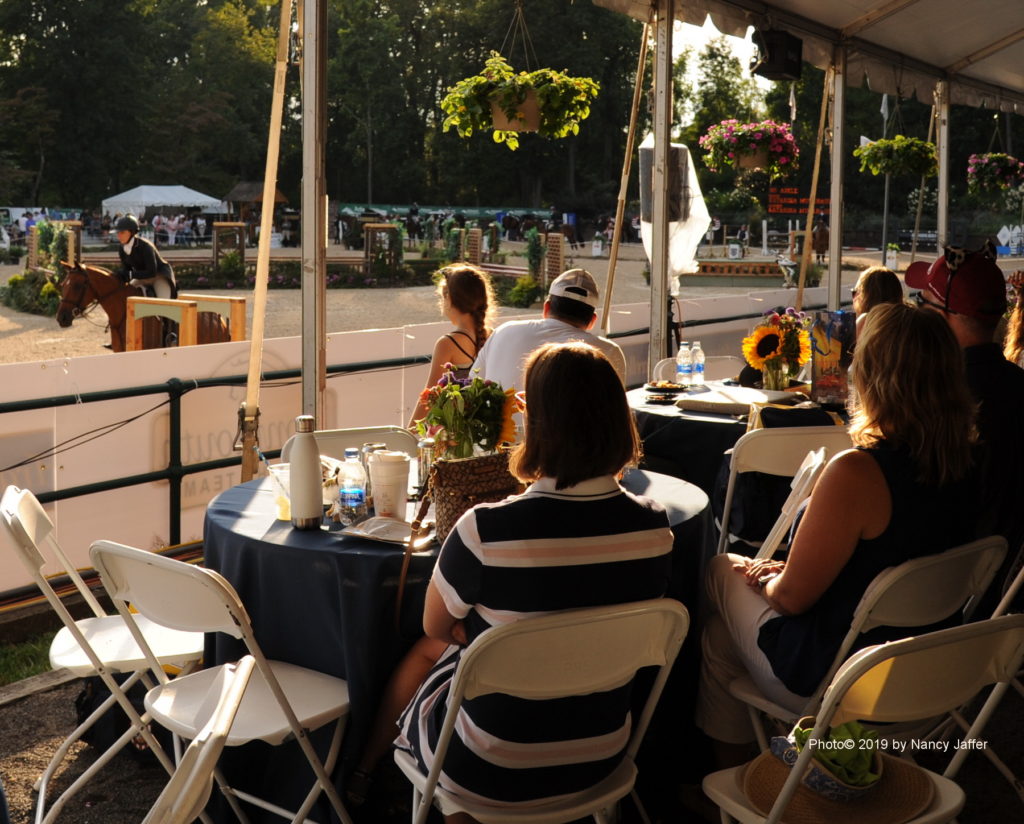
Hospitality is an important part of the show. (Photo © 2019 by Nancy Jaffer)
At Centenary, all the classes that had to be staged at the foundation over eight days can be held instead in four or five days by using two rings, which means staffing costs can be cut. And Centenary doesn’t have to rent a facility–they have one–so that’s less expense there as well and more money to benefit the Nature Conservancy.
“I think the show can survive,” Tucker said.
He noted they can apply for a jumper rating and have jumpers run in one ring while the A-rated hunter classes go in another ring. Half the day of hunter competition can be A-rated, while the other half could be C-rated and unrated..
Tucker said he and Michael are only “concerned about offering a viable solution.”
With Covid, a lot has changed, he observed, noting that because people didn’t want to travel as much during the pandemic, they would rent a place and set up for a month to participate in a multi-week show like Traverse City, Mich., or Tryon, N.C. Nearing the end of August, “to do a one-week boutique show, it’s not as enticing when you’ve been on the road away from home all summer and you’ve got your points and spent a lot of money,” he pointed out.
Reducing the number of days, making it more cost-effective and trying to run jumpers in conjunction with other classes instead of on separate days seems to be the way to approach it.
“There’s pros and cons to the concept, but I think it might be one of the only viable solutions to keep it going. We’ll see what Centenary says,” commented Tucker, noting it’s not yet a done deal.
“If someone stepped up who was super-interested in the dates and running them at the Team and either didn’t care about money or had ways of raising enough, I certainly would talk to anyone who I thought was a good representation of the industry and had the right vision.”
He added, however, he won’t let the dates go “unless they have a secure home. We’re completely flexible for a solution that makes sense.”
What should the show be called if it isn’t at the team?
Noting that there are still probably $5,000 worth of ribbons left over, Tucker suggested leaving the name the same for the first year and running a contest with a big prize for whoever comes up with the best name for the future.

